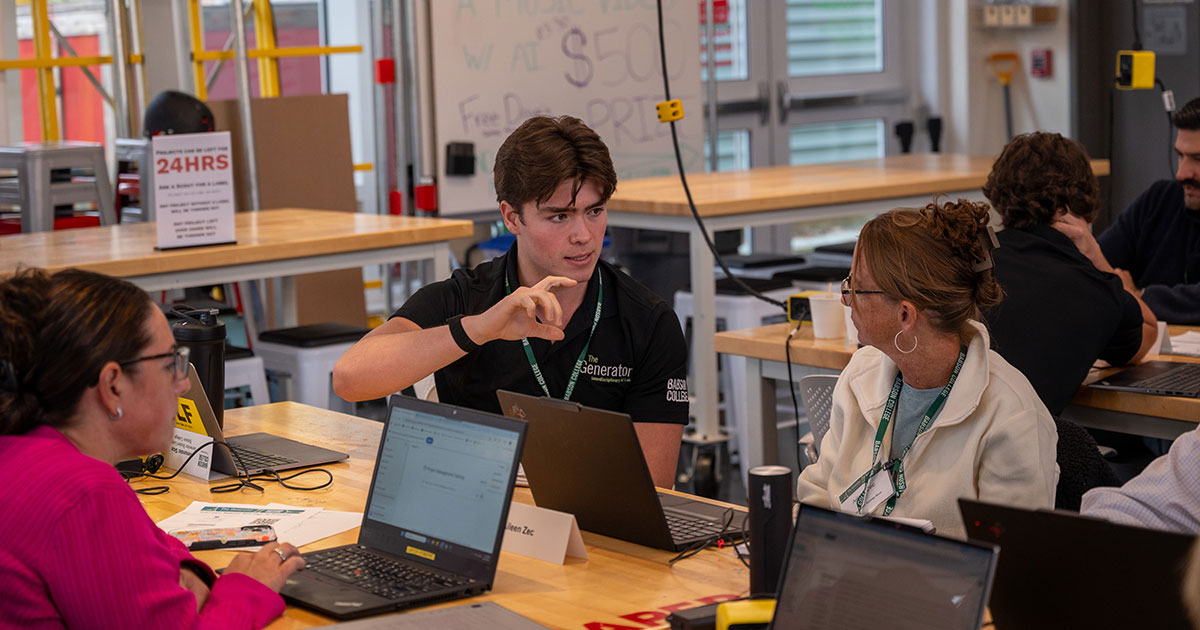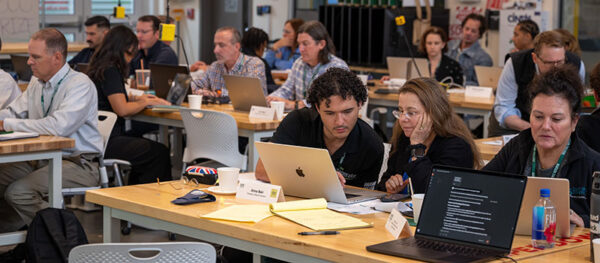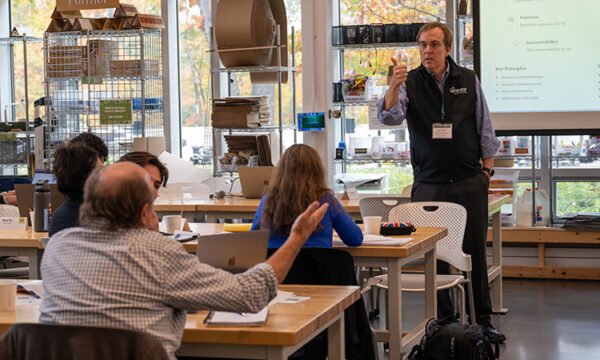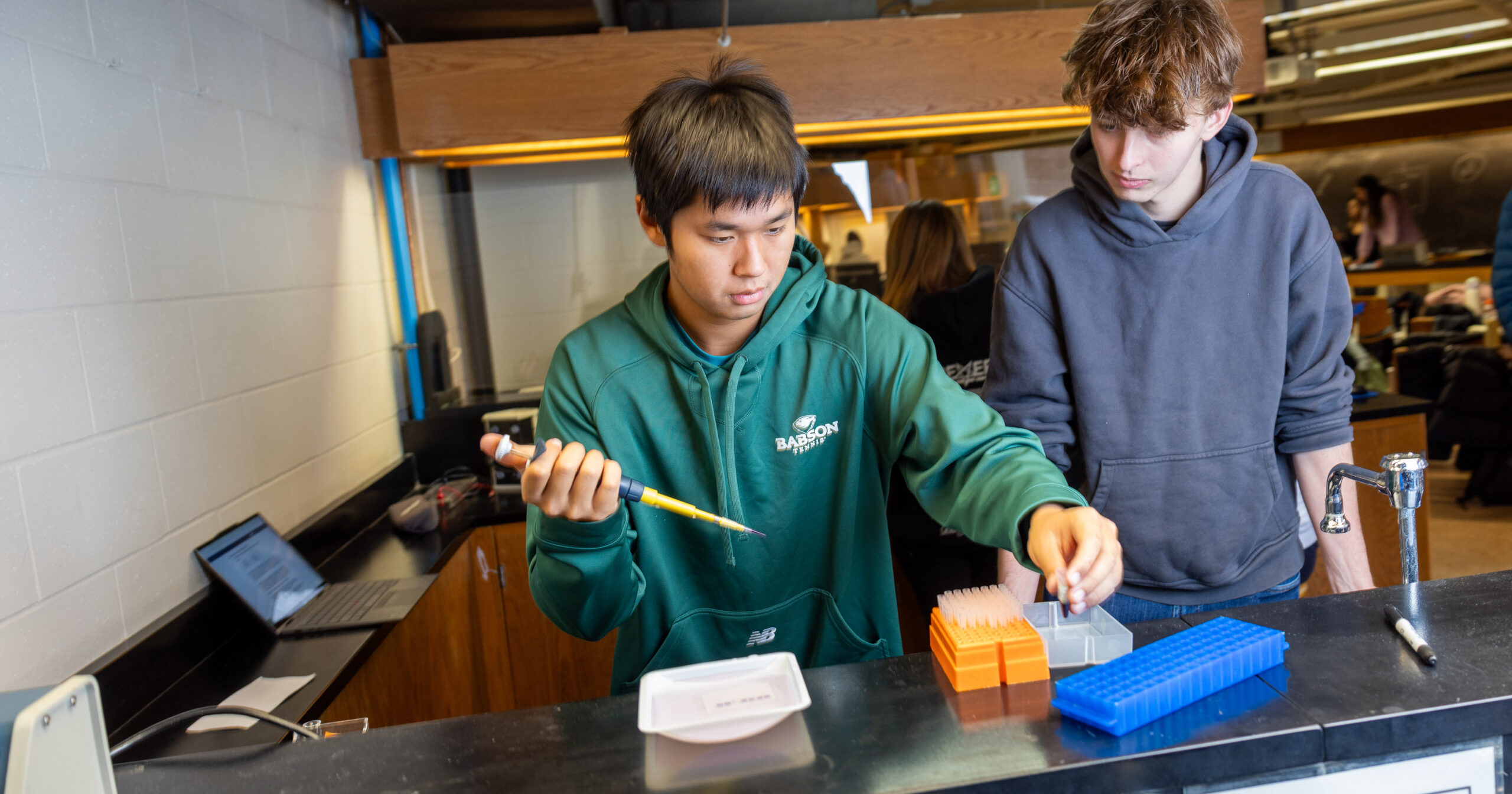A Tech Bootcamp: Babson Trains Small Businesses on AI

There must be a better way.
That was what David Hogan thought as he considered a lengthy and extensive PDF document, which was close to 300 pages. Hogan works as director of IT at North Easton Savings Bank, a Massachusetts regional bank, where the large document serves as a helpful but bulky retail guide for bank employees.
Thinking aloud, Hogan wondered if a chatbot could be created to help navigate the constantly updated document. A bank colleague took up the challenge, with the help of artificial intelligence. The results were stunning. “He turned around a chatbot in two days,” Hogan said. “It was amazing how fast it was done.”
Hogan was used to standard IT projects taking a couple of months to finish. The chatbot’s quick creation made him realize AI’s potential for his organization. “When I have a chatbot two days later, it opens your eyes,” he said. “You know you’ve got to pay attention.”
Hogan’s bank was one of 21 small businesses represented at the AI Innovators Bootcamp at Babson College in October. An ongoing program led by The Generator, Babson’s interdisciplinary AI lab, the bootcamp involves both Babson professors and students offering small businesses a one-day, hands-on dive into the technology, demonstrating how it can enable innovation and improve how they run their organizations.
October’s edition of the bootcamp was the second time The Generator has offered the program. More sessions are coming. As AI continues to force organizations to contend with its implications, The Generator plans to train 1,000 small businesses through future bootcamps. In the spring, the program will be incorporated into a new course for undergraduates.
Students play a critical role in the bootcamp, working closely with businesses, many of which are owned by Babson alumni. “Building ties between Babson’s AI-savvy students and small business owners, where both have something to learn from the other, goes to the heart of the initiative,” said Erik Noyes, the director of The Generator.

Students Working with Businesses
A sense of urgency filled October’s AI Innovators Bootcamp. While Hogan has been using ChatGPT for a while, the bootcamp showed him applications for the chatbot he hadn’t realized. Like so many, he is grappling with what AI will mean for his industry. “We are trying to stay ahead of our competitors,” Hogan said.
Another bootcamp participant, Jason Abelowitz MBA’14, echoed that sentiment. Abelowitz is the co-founder and the chief operations officer of Mindoro Capital Partners, a Boston-based wealth management firm. “We realized that, if we are not trained and integrating it in our company,” Abelowitz said, “we will fall behind.”
A variety of small businesses attended October’s bootcamp, including a real estate agency, a luxury rental company, a financial services company, a staffing business, and an indoor golf entertainment center, as well as a few nonprofits.
“The best thing I learned is that I shouldn’t be afraid of what I don’t know.”
Iain Ward, founder and CEO of Solar Agricultural Services, and an attendee of the AI Innovators Bootcamp
“We have seasoned business owners who know their business but don’t know AI,” said Noyes, an associate professor of entrepreneurship and the Michael London ’92 and Stephen H. Kramer ’92 Term Chair in Entrepreneurship.
For the bootcamp, Noyes partnered with Babson professors (Ruth Gilleran and Jonathan Sims) and a baker’s dozen of Babson students, who volunteered their time to assist the small businesses in attendance and answer any questions they may have.
That interaction builds relationships and gives students valuable experience. The last time The Generator offered the bootcamp, 10 participating students received paid internships with the businesses in attendance. “We’re not only teaching small businesses about AI,” said Gavin Mestler ’27, a student co-leader of the bootcamp, “but we’re also connecting small businesses with Babson students who are very knowledgeable about AI to solve complex problems together.”
Empowering Growth
One of the goals of the bootcamp, Noyes said, is to demonstrate how AI can empower growth. It’s a way for small businesses to imagine and pursue new opportunities. “We want them to use AI as a tool for innovation to help them create new products and services,” Noyes said.

At the same time, the bootcamp wants to show how practical and efficient AI can be. At one point during the program, which was held in the Weissman Foundry, Babson’s design and prototyping space, the students gave demonstrations on nitty-gritty topics where AI tools could make an everyday difference in the running of attendees’ businesses.
Those tangible topics included a look at accelerating marketing with AI, using AI to spend less time trapped in an email inbox, and the building of custom AI models for faster employee training. “We’re trying to make their lives easier,” Noyes said. “It’s very concrete. We’re not just trying to nerd out on them.”
In this rising age of AI, the bootcamp program illustrates Babson’s commitment to small businesses. Last week in Washington, Noyes spoke at a roundtable discussion convened by the JPMorganChase Institute on the use of AI by small businesses. In the spring, the College is launching a new undergraduate course focused on that same topic. Students taking the advanced experiential class will co-run two bootcamps and also interview small business owners, conducting an analysis of the businesses’ obstacles to growth.
“It’s building on Babson’s reputation as a pioneer in experiential education,” Noyes said. “We want students to have the opportunity to interact with business owners, and business owners to have the opportunity to interact with our best and brightest students.”
Not Afraid of the Unknown
As the October bootcamp neared an end, small business owners reflected on AI, on how overwhelming it feels and how much there is to learn. One attendee wondered what the ceiling for the technology is. Another marveled at the dizzying array of applications for AI.
“I wanted to know what I don’t know,” said attendee Iain Ward, the founder and CEO of Solar Agricultural Services, a West Wareham, Massachusetts, company that helps facilitate solar projects on farmland. Ward admitted he hadn’t used ChatGPT before attending the bootcamp. “The best thing I learned is that I shouldn’t be afraid of what I don’t know,” he said.
Thomas O’Rourke serves as president of the Neponset River Regional Chamber. Based in Norwood, Massachusetts, the chamber has about 450 member businesses. O’Rourke attended the bootcamp so he could be a better resource for them on AI.
“It’s on the minds of many of them. For those it’s not, it ought to be,” O’Rourke said. “The AI wave is rolling. You can either let it wash over you, or you go with it. Our businesses need to go with it.”
Posted in Insights




